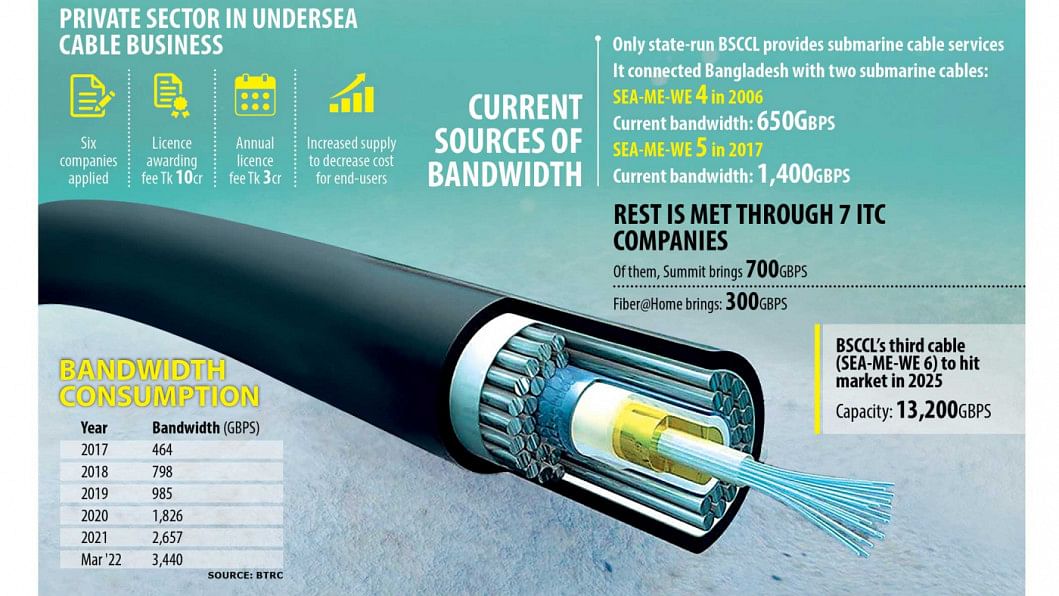Govt to open up submarine cable business to private firms

Private companies in Bangladesh are set to get licences to establish, maintain and operate submarine cables, in a shift that will break the state monopoly and pave the way for a smooth supply of bandwidth amid a surge in internet use.
The state-run Bangladesh Submarine Cable Company Ltd (BSCCL) is the lone entity permitted to connect the country with the rest of the world through undersea cables.
But in order to attract private investment to the telecommunication industry to support the growth in bandwidth consumption, the Bangladesh Telecommunication Regulatory Commission (BTRC) has floated a tender to grant licences. Six companies have applied.
According to the BTRC, the companies, including Summit Communications, Fiber@Home, and Mango Teleservices applied for the licence as of May 10, the deadline for the submission of the application.
"We have applied for the licence," said Md Arif Al Islam, managing director of Summit Communications.
It has signed a memorandum of understanding with an international consortium, and the final deal will be inked after obtaining the licence.
Once the private companies enter the market, there will be more supply of bandwidth, which will drive prices down and benefit end-users, said Islam.
The licensee will have to establish its submarine cable systems and offer services within two years from the date of securing the approval.
The licence will cost companies Tk 10 crore, and the annual licence fee will be Tk 3 crore.
The government will decide how many licences will be issued, according to a BTRC guideline.
"Our policy is to create opportunities for the private sector, so we are now allowing private companies to establish submarine cables," Mustafa Jabbar, telecom minister, told The Daily Star yesterday.
Private entities have presence in all areas of the telecommunication sector, including telecom, tower, internet service, and transmission network.
The minister said the government has initially connected the country through the state-run company since a huge investment was needed and there was uncertainty about the benefit of the investment.
"Now we have done the groundwork, and the business case is lucid to private entities."
Sumon Ahmed Sabir, chief technology officer at Fiber@Home, said: "We are ready to form a partnership to establish a submarine cable for the local market. This will enhance competition and bring down the price."
Abu Saeed Khan, senior policy fellow at Colombo-based think-tank LIRNEasia, said the private companies should have been allowed to establish submarine cables much earlier.
"Bangladesh is the only country in South Asia and Southeast Asia where the state-owned monopoly in the submarine cable business is prevailing. There is competition in other countries, including Myanmar, Sri Lanka and the Maldives."
Mohammed Shahedul Alam, chief corporate and regulatory officer at Robi, welcomed the government decision and called for awarding the licence to competent companies so that they can arrange the landing of submarine cables within the shortest possible time.
The move from the government comes as the use of bandwidth is growing at a break-neck pace in Bangladesh.
At the end of December 2008, the use of bandwidth was only 7.5 gigabytes per second (Gbps), serving 7.7 lakh people, according to the telecom minister. It was 600 Gbps in 2016.
The bandwidth consumption witnessed a remarkable rise during the coronavirus pandemic as people turned to internet to work, study and find entertainment at home.
The bandwidth use surged to 3,440 Gbps in March this year, up from 1,000 Gbps before the pandemic, according to the BTRC.
About 650 Gbps is supplied by BSCCL through the South East Asia–Middle East–Western Europe 4 (SEA-ME-WE 4) consortium, the first undersea cable with which Bangladesh was connected with in 2006.
BSCCL supplies another 1,400 Gbps through the country's second submarine cable, SEA-ME-WE 5. The connection was established in 2017.
The rest comes from India through seven international terrestrial cable service providers, with Summit Communications bringing in 700 Gbps and Fiber@home 300 Gbps.
IS BANDWIDTH SCARCITY IMMINENT?
Industry people warn Bangladesh could face the scarcity of bandwidth in 2024 as internet use is rising at a faster clip.
Alam of Robi says the life span of the first undersea cable is coming to an end in 2025 and the capacity has been exhausted. "So, we may face a bandwidth shortage if there are no new cables."
The current capacity of the second cable is 2,500 Gbps and it currently supplies 2,000 Gbps.
AKM Habibur Rahman, managing director of BSCCL, does not expect any bandwidth scarcity as the company has taken steps to keep the supply smooth.
"The capacity and time expansion of the first submarine cable is underway and we will announce it soon," said Rahman.
The company is set to receive 13,200 Gbps from the third submarine cable, SEA-ME-WE 6, in 2025.
"However, it is difficult to make predictions since internet use is expanding rapidly and the government has initiated measures to take digital services to a vast number of end-users."
More than 50,000 educational institutions will be connected to internet soon, said Jabbar. And the education ministry estimated the country needs 35,000 Gbps of bandwidth by 2030.
"But, to my estimate, we don't need that much bandwidth. Since we are allowing private entities to enter the market and there is the third cable, there will be no bandwidth crunch till 2030," said the telecom minister.
Islam of Summit Communication said laying cable underground is a difficult task and many parties are involved.
"So, if the licensee companies can't do it fast, there could be a bandwidth crunch."

 For all latest news, follow The Daily Star's Google News channel.
For all latest news, follow The Daily Star's Google News channel. 








Comments